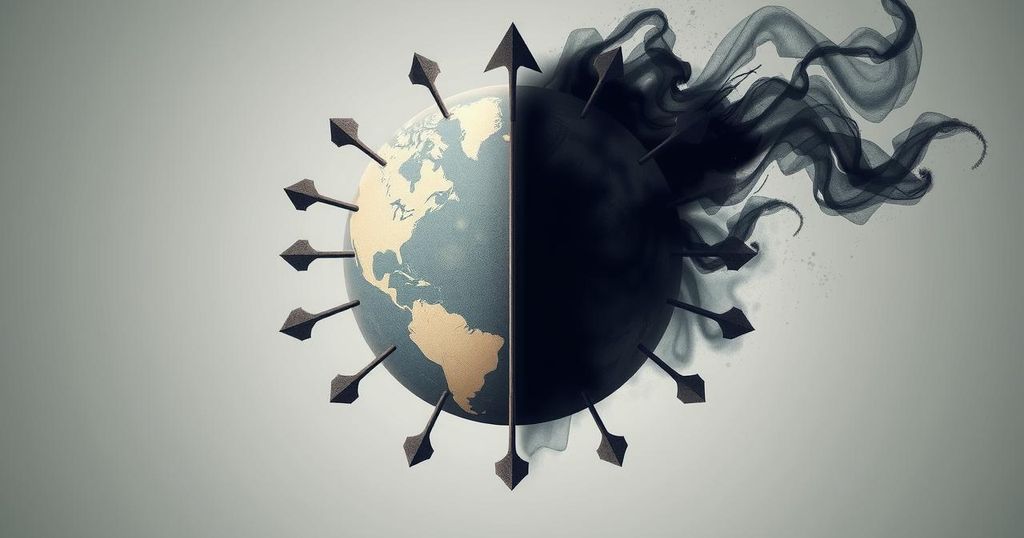World news
AMERICA, ASIA, BLOOMBERG, DEFENSE DEPARTMENT, DONALD TRUMP, DONALD TUSK, EUROPE, FOREIGN POLICY, INTERNATIONAL RELATIONS, IRAN, KYIV, KYIV INDEPENDENT, MILITARY SUPPORT, NORTH KOREA, ODE, OLEKSANDR MEREZHKO, RUSSIA-UKRAINE WAR, S CENTER FOR INTERNATIONAL STUDIES, UKRAINE, US PRESIDENTIAL RACE, VOL, WAR, ZE
Jamal Robinson
0 Comments
Ukraine Responds to U.S. Military Aid Freeze Amid Growing Concerns
On March 4, Ukraine learned of a freeze on U.S. military aid, causing shock and outrage among officials and soldiers. President Trump’s decision reportedly links aid to Ukrainian efforts toward peace. While some leaders express concern over the shift towards Russian interests, Ukrainian forces remain determined to defend against aggression and seek support from European allies, which are in the process of enhancing their defense capabilities.
On March 4, news emerged that the United States will freeze military aid to Ukraine, shocking the country accustomed to dire news. Volodymyr Dubovyk, head of Odesa National University’s Center for International Studies, stated this change prompted a reevaluation of U.S. foreign policy. Reports indicate that President Trump has directly ordered this freeze until he believes Ukrainian leaders demonstrate genuine intentions for peace. Although neither Washington nor Kyiv have confirmed this development, Polish Prime Minister Donald Tusk has noted corroborating information from the Ukrainian-Polish border.
This freeze is part of a broader strategy by the Trump administration to apply pressure on President Volodymyr Zelensky following a tense exchange in the Oval Office. The U.S. decision comes on the heels of a canceled mineral deal, reinforcing the perception among Ukrainians that the White House is favoring Russian interests over Ukraine’s. Lawmaker Oleksandr Merezhko voiced concerns, stating that the administration seems to be leveraging power against Ukraine, which he views as the victim of aggression.
President Trump had initially positioned himself as a supporter of Ukraine, placing the responsibility on Russian President Vladimir Putin to resolve the conflict. However, following conversations with Putin, the Trump administration’s stance towards Ukraine has shifted to one that mirrors Kremlin rhetoric, with Trump labeling Zelensky a “dictator” and questioning his validity. Yaroslav Yurchyshyn remarked that while the tone may have changed, Trump’s actions appear consistent with his goal of rapidly ending the war, even at Ukraine’s expense.
The military aid freeze, impacting over $1 billion in resources including arms and ammunition, takes effect immediately. It affects both future support and current shipments, raising alarms among Ukrainian forces. A Special Operations Forces sniper expressed frustration, stating, “America has sided with Russia, North Korea, and Iran, they have chosen the side of darkness.”
Despite the freezing of aid, Ukrainian soldiers remain resolute about defending against Russia’s invasion. One soldier affirmed, “There is no panic in the army,” and expressed optimism that European allies would provide the critical support needed to sustain their efforts. Bart acknowledged the aid freeze would have some consequences, but he emphasized that Europe remains a crucial ally in this endeavor.
As Ukraine shifts its focus to obtaining support from Europe, the European Commission announced the ReArm Europe initiative to bolster the EU’s defensive capabilities. President Ursula von der Leyen emphasized the urgency of finding alternatives to maintain supplies, declaring that Europe is ready to take on greater responsibilities in response to the situation. The effectiveness of this initiative will be crucial in filling the gap created by the U.S. aid freeze.
Lieutenant Colonel Bohdan Krotevych highlighted that air defense remains a primary challenge reliant on U.S. support. He urged that alternatives are required urgently as civilian lives are at stake due to potential missile shortages. Krotevych concluded by suggesting that the Trump administration’s understanding of this urgency may influence political repercussions for them in the future.
The recent freezing of U.S. military aid to Ukraine has generated significant unrest within the country, prompting criticisms of the Trump administration’s tactics that seem to favor Russia. Ukrainian leaders and military personnel remain defiant, vowing to continue resistance against Russian aggression while looking to European allies for support. The implications of this aid suspension may considerably affect Ukraine’s defensive capabilities and strategy, necessitating an urgent response from European nations.
Original Source: kyivindependent.com




Post Comment